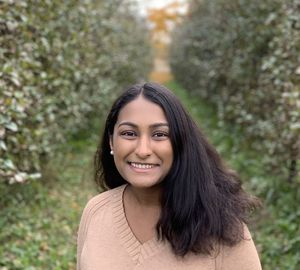Editor’s Note: Members of the Class of 2020 should be celebrating together this week, but the coronavirus pandemic canceled their pomp and circumstance. Last month, Margaret Duncan ’17 encouraged graduates to “say the things that catch in your throat,” to express their gratitude to the people who meant a lot to them in college. We invited a few to share those feelings on our website to bring a touch of virtual celebration and appreciation to this dispersed senior week.

I was never supposed to be an American studies major. I entered Notre Dame intending to study political science, and I thought that was all I needed. I was a political junkie who wanted to learn as much as I could about American government. But as I neared the end of my first year at Notre Dame, I felt that something was missing. I appreciated political science, but I yearned for more human perspectives to make the story complete. Whom did these laws impact? What were their experiences? How did they react?
I remember meeting with my first-year advisor during my first week of classes. I was unhappy with one of the courses on my schedule. She suggested that I switch to Introduction to American Studies to fulfill my history requirement. “A lot of first-year students enjoy this class,” she said. “It aligns well with your interests.”
I had no idea what American studies entailed at the time. As my advisor enrolled me in the intro course, I thought to myself, “American studies — the study of America? This class would be like AP U.S. History, right?”
Not at all.
I never really liked history in high school. I struggled with memorization and I could never retain any significant information after my exams. Walking into the Andrews Auditorium in Geddes Hall for the first lecture, I was skeptical. Professor Jason Ruiz stood on stage, masterfully leading a discussion in a class of 100 students as smoothly as he would have for a small seminar. He used words like hegemony, myth and narrative. He radiated warmth and power when he spoke, and he listened intently to his students. I was intrigued.
Seven months later, I was still intrigued. I remember trekking to Flanner Hall on Monday, April 3, 2017, to meet with Professor Ruiz. I desperately wanted to declare American studies as my second major before registration for Fall 2017 classes began. I kept coming back to the department’s course catalogue. With classes like Witnessing the Sixties, the Asian American Experience, and Journalism and Society, I knew American studies offered exactly what I needed to fill the gaps in my political science degree.
- Senior Moments
- “My ‘Why',” Mary Bernard ’20
- “Major Impact,” Laksumi Sivanandan ’20
- “Mia Out!” Mia Berry ’20
- “Portrait of Friendship,” David Korzeniowski ’20
I never thought I would cherish my treks to Flanner Hall so much. I miss them in every way — on a sweltering August morning, in the middle of a January snowstorm, even during a torrential March downpour. Each time I mentioned that I would be walking there, I would get confused reactions. “Why?” my friends would ask. “What’s in Flanner Hall?”
Well, there are lots of things in Flanner, but the 10th floor has the best office –– the Department of American Studies. Like every departmental office, there are free snacks and coffee. But unlike every other office, there’s Katie Schlotfeldt, the glue that keeps the department together, always ready to chat when I enter.
Through a curtain of colorful beads sits Professor Annie Coleman, whose chill demeanor instantly made her a beloved professor. Tucked away in the corner office is Professor Thomas Tweed, the former department chair. He intimidated me at first, but his self-deprecating jokes and compassion were much appreciated as our senior seminar shifted online this semester. Professor Brian Collier, an eclectic, loving educator, opened my eyes to the struggles of indigenous communities around the world. He concluded each class with, “I’ll miss you while you’re gone.” And that’s exactly how I felt in quarantine.
American studies courses were the ones that really made me think. Encouraging us to dismantle the gendered myths we had learned throughout our lives, Professor Perin Gurel redefined my perspective on womanhood. Professor Pete Cajka always turned his classes into conversations, navigating topics such as civil rights and counterculture with ease and fluidity. Professor Jennifer Huynh exuded kindness as she pushed us to consider the grim intersectional experiences of immigrants.
Oftentimes I would leave class with more questions than I had at the beginning. Using societal lenses such as gender, race, class, labor and more, my education covered every facet of the American identity. I know that as I embark on my professional career, I will rely on my American studies background the most.
How do you show your appreciation to professors at the end of the semester? Do you simply say thank you and leave? Do you stick around after class to shake their hands? Or do you send a thoughtful email with your final assignment attached? As an introvert, the latter is typically my style.
Thinking about how to thank my professors in the world’s current circumstances, I am lost. There are no conventions for this process, and emails simply cannot convey my gratitude. I hope this love letter will suffice.
Laksumi Sivanandan, vice president of the Class of 2020, received the University’s Mike Russo Spirit Award recognizing service and personal character.